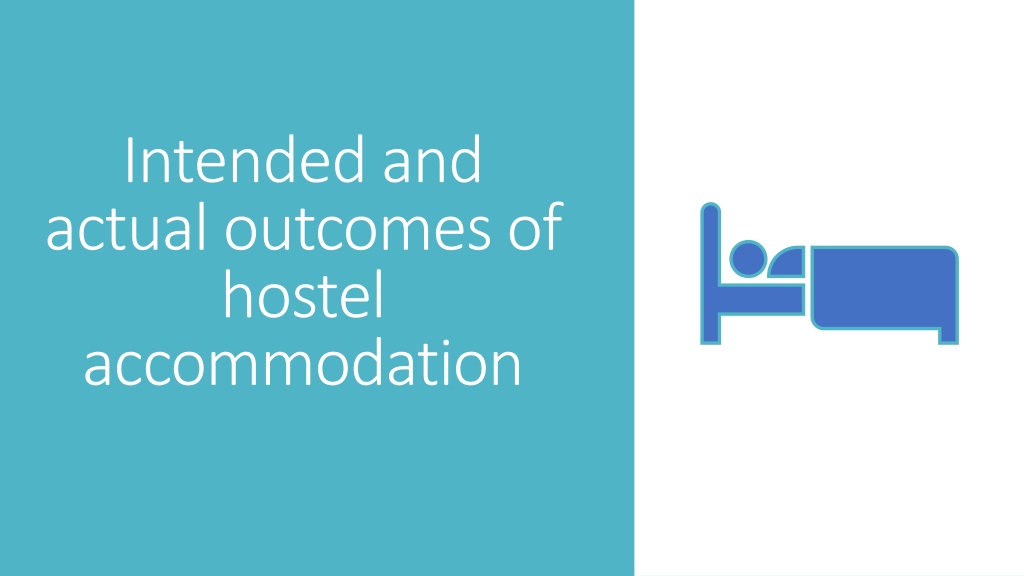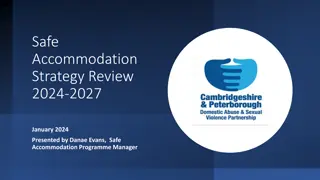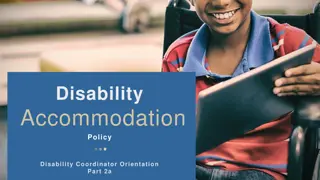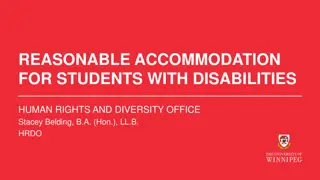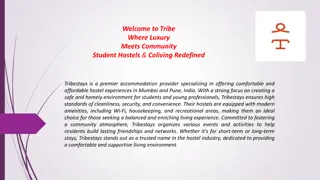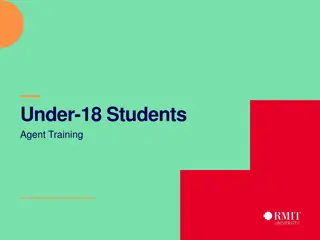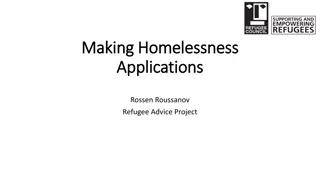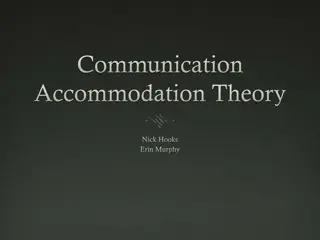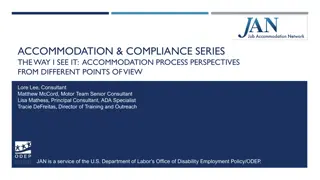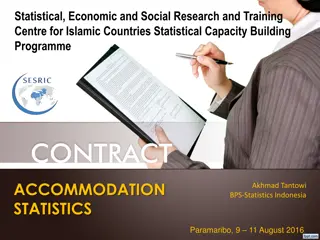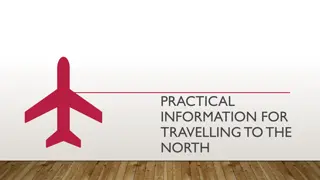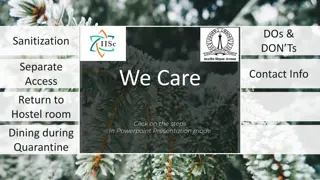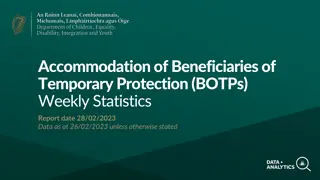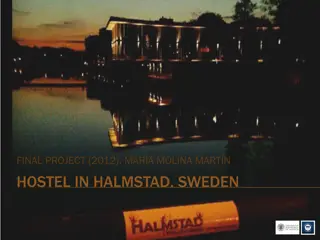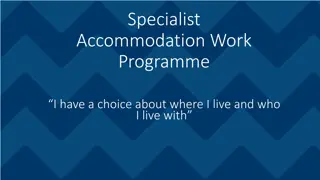Understanding the Impact of Hostel Accommodation on Individuals
The debate surrounding hostel accommodation delves into the potential challenges of shared living spaces like bullying and predatory behaviors, while also highlighting the transformative effects it can have on individuals, offering opportunities for growth, healing, and community bonding. The necessary components of hostel living involve physical shared facilities, limited private space, and institutional control. Various support models cater to different client groups with specific needs and lengths of stay, emphasizing diverse approaches from psychology-oriented to faith-based and harm reduction-oriented programs.
Download Presentation

Please find below an Image/Link to download the presentation.
The content on the website is provided AS IS for your information and personal use only. It may not be sold, licensed, or shared on other websites without obtaining consent from the author. Download presentation by click this link. If you encounter any issues during the download, it is possible that the publisher has removed the file from their server.
E N D
Presentation Transcript
Intended and actual outcomes of hostel accommodation
The debate The debate there will be bullies, there will be people who are predators . . . if you're in shared accommodation . . . pretty nasty things happening to you are much more likely (Key informant, academic) [we have] seen countless lives changed in shared accommodation in a way that . . . doesn't happen in single-tenancy accommodation . . . significant life change can take place within a shared environment . . . skills, confidence, recovery, healing, new opportunities . . . that is distinct to what can happen in a more general community (Key informant voluntary sector, hostel provider).
Necessary NecessaryComponents Components Contingent ContingentComponents Components Physical Physical Shared Facilities Dwelling Size Space Space Communal Living Social Social Limited Private Space Support Hostel Components Space Space Staff Supervision Legal LegalSpace Space Temporary Occupancy Limited Tenancy Rights Eviction without Court Action Institutional Control of Access Busch-Geertsema and Sahlin 2007; Edgar and Meert 2005; Rosengard 2001; Warnes et al 2005
Support Support Model Model Ethos Ethos Size Size Form Form Client Client Group Group Needs Needs Length Length of of Stay Stay Gender Gender Psychology-oriented Secular Small 5-10 Single rooms Single homeless Complex Less than 1 year Women Secular Medium 15-20 Single rooms Sleeping rough Complex Unspecified Mixed Psychology-oriented Psychology-oriented Secular Large 45-50 Single rooms Sleeping rough Complex Less than 1 year Mixed Faith-based Small 0-5 Single & transitional flats Young people General Less than 2years Mixed Abstinence-oriented Abstinence-oriented Faith-based Small 10-15 Single & shared rooms Single homeless Complex Unspecified Women Faith-based Medium 15-20 Single & shared rooms Single homeless Substance Use Less than 2 years Men Abstinence-oriented Harm reduction-oriented Unspecified Medium 20-25 Single & shared rooms Sleeping rough Substance Use Less than 2 years Mixed Secular Medium 25-30 Single Rooms Single homeless General Less than 2 years Mixed Harm reduction-oriented Harm reduction-oriented Unspecified Large 30-35 Shared Rooms Single homeless General Less than 6 months Mixed
INTENDED ACTUAL INTENDED ACTUAL Independence Dependence Safety Harm Inclusion Exclusion Progress Progress Entrenchment Entrenchment
It's all about . . . promoting independence . . . the ultimate goal is to move on successfully (Hostel worker) Our main purpose is to support them to get ready to move on to more independent accommodation. (Hostel worker) Independence
Her [hostel] room was a cowp [mess] . . . she would refuse to take any independent living skills that we were giving her in the hostel, really freak out . . . fought against everything . . . In her flat, [it s] immaculate . . . [She would say] I know what to do and I'll do it in my own time,' and she has. Her flat is lovely (Hostel manger) Independence
Priority we would put it [capacity for independent living] as a high priority in terms of how we see them moving forward . . . but day to day it's not the main focus (Hostel worker) I'd be lying if I said that that was the bulk of our work. It's really not. The bulk of our work is around harm minimisation. I think often there's a small window of time where we do a lot of life skills stuff perhaps just before somebody moves on, but that often is lesser to the crisis management stuff (Hostel manager)
it is a real risk that people have the sense of community and routine and structure that works really well for them and they then become a bit institutional like they only feel they can manage in this environment (Hostel worker Dependence People don t want to move . . . it s the family they ve never had, it s the community they ve never had and the fear of leaving that . . . if . . . in your life, [you ve] been rejected, left alone, left isolated . . . knowing that you potentially might move somewhere on your own and never get it again (Key informant, voluntary sector, hostel provider)
That would be, absolutely, the prime; safety is everything. People have a right to feel safe (Hostel Manager). People feeling safe in your building is sort of the foundation stone of being a psychologically informed environment. You can't be psychologically informed if people don't feel safe (Hostel Manager). Safety
[conflict] is almost like a necessary evil . . . It's one of these things that you almost can't avoid (Hostel worker) all the time [we get] . . . people preying [on others]. It is exploitation, it is grooming . . . people choose the people who are the most vulnerable . . . that happens all the time and will be something we're continually trying to manage (Hostel worker) Harm
Hostels are really horrible places to live . . . the levels of just incidents and risk, that's not a pleasant environment for people to live in . . . [our hostel] is a very lovely, snazzy new building . . . it's in a really nice environment . . . a great staff team, really good in reach services, but I still don't think you should be there long-term (Hostel Manager) Harm Harm
We're a strict no visitor [hostel] and that works . . . I don't think you can effectively manage visitors in a large project, so no visitors, and that means we know who's in the building and we know the risks, and we can manage that, and that helps keep people safe (Hostel Manager). Inclusion I definitely think there's a community that's formed and there's a sense of belonging created and people are supported . . . I don't know that it's social inclusion in the wider sense of society. I think it's more inclusion within the hostel (Hostel Manager).
Some of the times when we've had to ask people to leave, I've thought this is one of the downsides of this kind of [model] . . . In a community setting I would have no problem to continue this working relationship, but actually the impact on the community and the other people living here is too great (Hostel Manager). Exclusion
[Exclusion is] one of the most horrific things . . . It's more extreme when people have really maybe for the first time ever experienced this type of care and love . . . they're coming back to the door under the influence, they're quite childlike, because they're missing it that much and so the hurt and the missing can come out in a bit of anger sometimes (Hostel Manager). Impact of Exclusion
to achieve the place of safety . . . we might say we're going to have this specific line, and if it gets crossed the person has to not live here anymore . . . we don't really like to have those hard and fast rules because then you have to abide by them . . . The perpetrator is a service user too and they have a need . . . we would say, challenging behaviour is an opportunity for engagement, rather than something to just be simply punished with eviction. I think on the ground though, it's really difficult . . . [if you] have someone, say, produced a bladed article or punched someone (Hostel Manager) Navigating the Navigating the Safety Safety- -Harm Harm Tension Tension
I have been homeless now I'd say for give or take almost 12 to 13 years . . . I was spending six months at a time on the streets, and I'd get myself into a shelter or something and then just didn't feel comfortable, so I tend to be going back out on the streets again (Joe) I've covered [this area]! . . . There's not one [hostel] you could name that I don't know . . . seriously. (David) I've been [in hostels] here, there, and everywhere. I've been in [area one] . . . , I've been in [area two] . . . , I've been in [area three] . . . , I've been in [area four]. . . , [area five] . . . (Chris)
the person who moves forward, that's what we're trying to sell, that's what we're trying to say we can do. You can move in here and we can help you move forward . . . the people who don't do that [move forward] or who backslide or . . . [who go] through the revolving door, or . . . never really seems to get better. They are like the thorn in our [the hostel sector] side, like [we say] shush . . . no, no, no, but they're non engagers, like it's their fault, rather than saying well actually what's not working for them in this system (Hostel manager)
Thank you Lynne McMordie Lm154@hw.ac.uk
